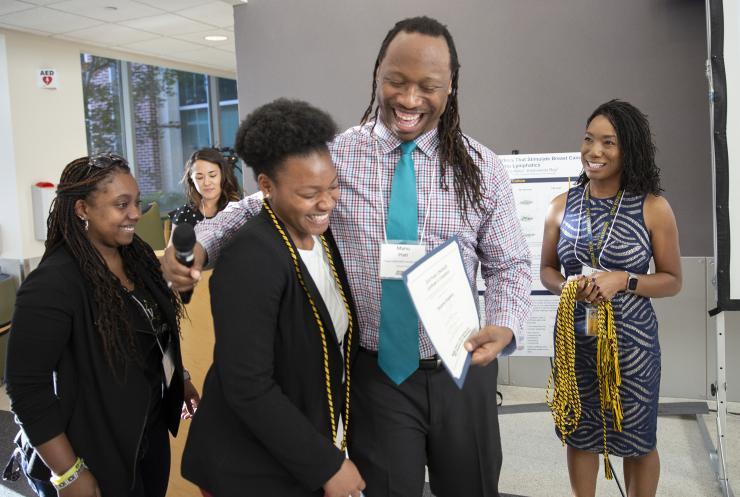Georgia Tech Project ENGAGES Striving for Excellence
May 24, 2018 — Atlanta, GA

Now in its sixth year, Project ENGAGES at the Georgia Institute of Technology has been around long enough to have some established traditions. For example, at the end of every academic year, ENGAGES students, families, mentors, faculty, and staff are treated to inspiring presentations from national thought leaders in the world of scientific research.
This year, ENGAGES leadership outdid itself, bringing two of the nation’s most influential leaders in their respective fields to the Petit Institute for Bioengineering and Bioscience in the past month.
First, Myrtle Potter, named one of Fortune magazine’s Most Powerful Women in Business three times, shared the story of her rise to becoming one of the nation’s foremost healthcare leaders and innovators at a special event in April. Then, at the annual ENGAGES Senior Celebration on May 7, Raphael Lee, a pioneering and entrepreneurial surgeon, researcher, and biomedical engineer gave the keynote address.
“The success of this program is critically important for all of us,” Lee told a packed atrium in the Petit Institute. “You’re setting a trend for many of institutions around the country.”
ENGAGES (Engaging New Generations at Georgia Tech through Engineering & Science) is a high school science education program that was developed at Georgia Tech, partnering with six minority-serving public high schools in Atlanta (Coretta Scott King Young Women's Leadership Academy, B.E.S.T Academy, KIPP Atlanta Collegiate, Benjamin E. Mays High School, Charles R. Drew Charter High School, and South Atlanta High School).
The program is co-directed by Bob Nerem (founding director of the Petit Institute) and Manu Platt (associate professor in the Wallace H. Coulter Department of Biomedical Engineering), and managed by Lakeita Servance, who said Project ENGAGES, has reached more than 100 students. “Each year seems to get better than the one before and I’m so happy to see our students flourish beyond what they imagined,” she said. “We’re excited to celebrate our newest graduates from the Class of 2018 and their acceptance into top universities.”
This year’s group of 17 departing high school seniors have been accepted into 10 different universities, where they’ll pursue a wide range of academic interests:
• Gabriel Brown, Georgia State University (GSU), majoring in public health
• Diamond Clark, University of Georgia (UGA), biology
• Jasmine Coley, New York University, computer engineering
• Nzinga Hammonds-Wyatt, Georgia Tech, computer science
• Zaria Hardnett, Georgia Tech, neuroscience
• D’Angelo Howard, GSU, mechanical engineering
• Amanda Jeter, UGA, mechanical engineering
• Jasmine May, University of Pennsylvania, psychology/pre-med
• Marsha McCray, Depauw University, engineering
• Kaiya Mitchell, Georgia Tech, biomedical engineering
• Ty Price, GSU, engineering
• Tatiyanna Singleton, Vanderbilt University, engineering
• Clinton Smith, Georgia Tech, biomedical engineering
• Natasha Stallings, George Washington University, biomedical engineering/pre-med
• Percie Thompson, Agnes Scott College, international relations
• Sanyu Watson, Georgia Tech, mathematics
• Akeen Williams, Georgia Tech, engineering
Looking at the graduates and their families, Lee thought back to more than 50 years ago, when he was graduating high school in Charleston, South Carolina, one of the first students to participate in federally mandated desegregation. And he thought of the poem by Robert Frost, The Road Not Taken, a life path that Lee says he is familiar with.
“You’ve also chosen a road not often taken, and that’s a very important decision,” Lee told his audience, though he was speaking directly to the graduates and their families. “You are smart people, so you probably suspect that the road is less traveled because it is steeper, maybe more slippery, more dangerous. But you’re up to the challenge. You eat pressure and stress for breakfast, and ultimately, you want to make a difference, and for that I want to congratulate and encourage you. The success of this program is critically important for all of us. You’re setting a trend for many institutions around the country.”
Potter’s presentation, almost two weeks earlier, was less poetic than Lee’s but no less inspiring. Raised in New Mexico, she turned an early interest in science into a biotech career, helping to guide the launch of breakthrough, billion-dollar products for corporate giants like Genentech, Bristol-Myers Squibb, and Merck and Company.
“What you are doing and studying is incredibly important,” Potter told her audience in the Suddath Room. “You’re working on the cutting edge of science. What you’re doing will impact the people who come after you.”
And she offered encouragement for those students considering a career in industry, whether on the research side or the business side, especially in light of reports that there are more Ph.D. scientists than there are academic career opportunities.
“On the business side, we are desperate for Ph.D. scientists, and black Ph.D. scientists are at a premium, I can assure you,” said Potter, now CEO of Myrtle Potter & Company, the global life science advisory firm she started in 2005.
Throughout her presentation, Potter tried to impress on her audience how immersed she is in not just the life science industry, but in the continuing diversification of the industry.
“I’m passionate about opportunities for people of color, for women,” she said. “The industry is too big, the opportunities are too huge, the needs are too great for me to just hear your stories and not get worked up to the point where I feel a little sweaty on my forehead. I care about patients, the science, the people – that’s what you see coming through.”
Her message came across, according to Servance.
“The students raved about the lecture,” she said. “Myrtle’s talk accomplished exactly what I hoped for. It uplifted our students, especially the young ladies, and made them feel empowered to strive for excellence.”




